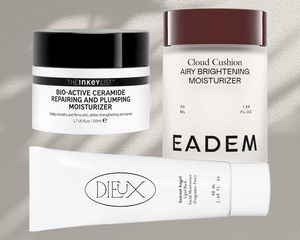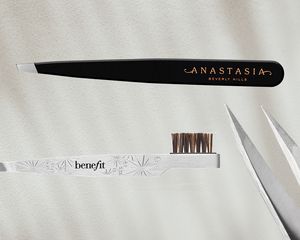:max_bytes(150000):strip_icc()/GettyImages-159626952-d1f9eb3fdb80475bbc604dac5e0c4d8e.jpg)
Nose hair waxing videos have become one of the most popular social content categories of our time. Whether it's personal research, general curiosity, or can't-look-away horror, we just can't get enough of watching people getting their nose hairs pulled out. But what about actually undergoing the process yourself? Unlike trimming or awkwardly (and dangerously!) trying to shave the area, nose hair waxing provides a long-lasting solution to pesky nose hairs poking out. Note that this doesn't mean removing all nose hairs. There's a reason to keep some length: Your nose hairs act as an air filter. For the same reason, nose hair waxing can be a delicate task that's best left to the pros.
To learn more about waxing this pesky area, we spoke to Deidra Green, waxing expert and Senior Field Training Manager for European Wax Center, and dermatologists Dr. Lauren Penzi and Dr. Marisa Garshick.
Meet the Expert
- Deidra Green is European Wax Center's Senior Field Training Manager.
- Lauren Penzi, MD, FAAD, is a board-certified dermatologist at MDCS Dermatology in New York.
- Marisa Garshick, MD, is a board-certified dermatologist at MDCS Dermatology.
The Importance of Seeing an Expert
First and foremost, Green emphasizes how important it is to see a licensed Waxing Specialist who performs the service regularly. The quality of wax and waxing technique is especially important when dealing with the nose area, so choose a reputable salon or spa if you're looking to get the service done.
And while some might be tempted to try the at-home route, dermatologists say that's not the best idea. "I do not recommend waxing certain facial areas at home, including delicate areas like your nostrils where the hairs are embedded in a delicate mucosa with numerous blood vessels," says Dr. Penzi.
Garshick concurs, saying, "Generally waxing is overall safe to do on the face when performed at a trusted location, though still may have a risk of skin irritation, burn or sensitivity."
What To Expect During a Full Nose Hair Wax
Now, you may be wondering, "How in the world do you wax inside your nose?" First, wax is applied to the tip of a small wooden applicator in the shape of a ball and allowed to cool for some time. Then the tech will place the applicator inside the nostril, not going any farther than the ball of the nose for obvious safety reasons. Then, the esthetician will pull the applicator from the nose, hopefully taking the hair with it. At European Wax Center, Green says they use an Exclusive Comfort Wax, which is a hard wax and the most effective and gentle for removing nose hairs. Also, Green says that you can choose between having both nostrils done at the same time or one at a time, depending on your comfort level.
"Although it seems like it would be a painful experience, most remark at how they don’t feel a thing and love the fact that they feel more confident not having to worry about sneaky hairs that show in their nostrils," Green says.
What Is a Partial Nose Hair Wax?
Normally, this removes the hair at the edges of the nostril—therefore, it's not as invasive as a full nose wax, but still removes the hair that usually pokes out, bothering people the most. And because the product isn't going inside the nose, you can also sugar the hair. Sugaring is gentle on skin and some say it is less painful than waxing.
Potential Side Effects of Nose Hair Waxing
"Waxing this area risks injury and infection," says Penzi. "Nose hairs are essential filters that help keep bacteria and other toxins out of our respiratory system. They also help to filter the air we breathe in through our nose, so waxing the nose hairs can leave you susceptible to environmental irritants and infectious pathogens."
"As a general rule, you want to wax healthy skin," says Green. "If the skin inside the nose were irritated in any way, I would not recommend waxing until it was healed. It's also important to only wax the hairs you can see in the nostrils and not try to force wax into places you cannot see."
Green explains that with waxing can come with other side effects, too. That may include redness, some soreness, bumps, and possible ingrown hairs that come later. The nostril area is a very delicate place and it's hard to see what exactly is going on with the skin inside. Having these side effects is often more annoying and painful in the nostrils, than say, your legs or underarms. As for waxing your nose at home, many more risks come into play. Green says you could potentially break hairs which could cause ingrown hairs. Also, you could potentially burn yourself by using a waxing system or heating wax where it is difficult to regulate the temperature. "The quality of wax sold over the counter vs. professional can also be really harsh on the skin," she explains. "You may have to go over the skin or area being waxed several times, risking damage and causing irritation." Bottom line, if you are considering a nose wax, it's best to leave it for the pros.
Cost
A nose hair waxing typically costs around $20, depending on the salon you choose and where you live.
Aftercare
Similar to waxing other parts of your face, you may feel some irritation or discomfort post-wax. Stay away from particularly steamy environments for the first 48 hours, making sure to wash the face with tepid (versus hot) water, refrain from steaming the face, and avoid lingering over boiling pasta water for longer than absolutely necessary. While you can apply a soothing, non-comedogenic lotion or aloe-based gel to the skin around the nose it's important to remember not to put anything inside the nostrils. This can cause further irritation or even infection to the interior skin and may affect the nasal passages and respiratory tracts as you inhale.
How Often Should You Wax Your Nose?
"For most services and areas we recommend waxing every 3-4 weeks," says Green. "For more visible areas such as the face, like lips and noses, some guests come to receive waxing services every 2 weeks."
Byrdie Tip
Green points out that waxing regularly helps to thin hair and make each visit more comfortable pain-wise.
Nose Hair Waxing Alternatives
If waxing doesn't do it for you, you have options beyond letting the hair poke out. Another way is to trim the nose hair. Fortunately, there are trimmers and scissors specifically designed for this purpose. Remington's Nose, Ear, and Detail Trimmer comes with two trimming attachments (vertical and rotary). Also, this trimmer can remove ear hair and trim eyebrows. Conair's True Glow Discreet Nose & Ear Trimmer has also garnered great reviews. It uses a diamond-shaped, three-bevel blade for a safe trim.
The Final Takeaway
The idea of getting a nose hair wax can send a shudder up anyone's spine. But, for those who are adamant about grooming any outwardly visible growth, seeing a trained specialist for a nose hair wax can provide a surge of confidence. While experts agree that waxing is generally safe when performed at a trusted location, they heavily advise against taking matters into your own hands as you could disrupt the delicate mucosa and numerous blood vessels in the area.

